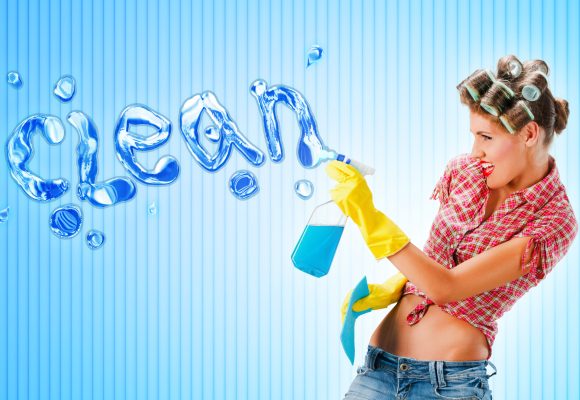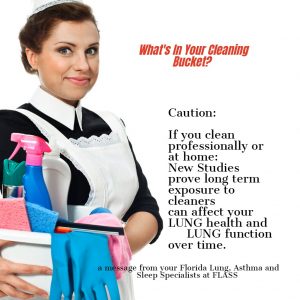Lung health can become a challenge with the arrival of spring. Many factors also influence lung function at this time of year. The flu season lingers. Spring brings allergy. Plus, it is time to do spring cleaning.
Very few women mop the floor wearing the pearls and high heels of the ideal 1950’s housewife as portrayed in old TV shows. Yet most women still cling to the custom of “Spring Cleaning.” This will be the jumping off point for this important blog. Florida Lung, Asthma and Sleep Specialists want to warn you about the hazards of house cleaning.
House Cleaners Can Be Hazardous to Lung Function
That sounds funny, doesn’t it? However, serious lung issues can develop from today’s high powered house cleaning agents. And researchers at the University of Bergen in Norway have been proving that concept.
Spring Cleaning, Cleaning Sprays and Lung Health.

“Bleach and Ammonia Makes a Wonderful Mixed Drink-
But It Has a Terrible Odor.” Not only should you not drink cleaning chemicals, but Studies prove you should not breathe them over extending periods of time.
Recently, lung research reports have challenged the way modern women clean and their lung function. Today the doctors and staff of the Florida Lung, Asthma and Sleep Specialists (FLASS) want to bring awareness of this new research to the attention of our patients, families and blog readers.
In fact, recent research has investigated lung function in two cleaning groups:
The first group was Women who regularly use cleaning sprays at home.
The second group included Women who work as cleaners in a career capacity.
The Research from the University of Bergen in Norway has focused on several cleaning issues you, your wife, or your mother might have actually done this morning. Many women begin housecleaning long before the family starts their daily routines. We mainly mean they began spraying, dusting, waxing, washing and scouring with powerful cleaning solutions on counters, sinks, cupboards, stoves, cabinets and floors.
Cleaning and Chemical Exposure
1. FLASS knows that people are very blithe about many common chemicals. Modern women believe these

This study did not focus on men’s cleaning habits. The majority of domestic cleaners within the 6000 of the study were female.
chemicals are the standards of home cleanliness, at home and at work.
The researchers are concerned that “Cleaning tasks may imply exposure to chemical agents with potentially harmful effects…” Harmful effects “to the respiratory system and increased risk of asthma and respiratory symptoms among professional cleaners and in persons cleaning at home has been reported.”
2. As they began their study, researchers found very little background on the long-term consequences of cleaning agents on respiratory health. This lack of long-term data led them to design the objectives of their study.
The research became an investigation of the “long-term effects of occupational cleaning and cleaning at home…” Research concentrated on “lung function decline and chronic airway obstruction.” They wanted to compare the lung function and overall lung health of the two groups of women mentioned above.
The Research Method: Lung Function vs. Cleaning Agents and Long-Term Exposure
The University of Bergen in Norway set up long-term studies reaching across 20 years. There were at least 4 check-ins on over 6000 women who were professional cleaners. It also included who cleaned regularly at home.The senior study author Cecile Svanes, MD, Ph.D., a professor at the university’s Centre for International Health. Dr. Svanes stated,
“While the short-term effects of cleaning chemicals on asthma are becoming increasingly well documented, we lack knowledge of the long-term impact…” She added a strong concern that we share here at Florida Lung, Asthma and Sleep Specialists:
“We feared that such chemicals, by steadily causing a little damage to the airways day after day, year after year, might accelerate the rate of lung function decline that occurs with age.”
More information on specific chemicals and possible lung damage can be found at lung.org.
The Findings: Results of the Research into Cleaning and Long-term Effects of cleaners
As you might expect, the researchers concluded, “Women who work as cleaners or regularly use cleaning sprays or

“You Would Not Believe How Many Different Cleaners I Use Every Day.”
other cleaning products at home appear to experience a greater decline in lung function over time than women who do not clean…”
Facts from the University of Bergin Research, Especially for Our Deep Readers
The study found that compared to women not engaged in cleaning:
Scholars define FEV 1 is the amount of air you can exhale forcibly in one second.
1. Overall the FEV 1 scores declined 3.6 milliliters per year faster in in women who cleaned at home and 3.9 ml/year faster in women who worked as cleaners. (They were compared to those who did not clean.)
2. Forced vital capacity (FVC), or the total amount of air a person can forcibly inhale, “declined 4.3 ml/year faster in women who cleaned at home.” And that the amount declined ” 7.1 ml/year faster in women who worked as cleaners.”
Lung Function Revealed How Dramatically Cleaning Chemicals Affected Women’s Lungs
To their horror, we imagine, the authors of these research studies discovered that “the accelerated lung function

Housewife happily cleaning with detergent, spring cleaning. She is mindless of the new danger of cleaning agents over extended periods of time..
decline in the women working as cleaners was “comparable to smoking somewhat less than 20 pack- years.”
Øistein Svanes, a doctoral student at the Department for Clinical Science eloquently put it this way. “However, when you think of inhaling small particles from cleaning agents that are meant for cleaning the floor and not your lungs, maybe it is not so surprising after all.”
Also unsurprising, but sad is the fact that “The study did find that asthma was more prevalent in women who cleaned at home (12.3 percent) or at work (13.7 percent)…” This was “compared to those who did not clean (9.6 percent).
Your Lung Health, Spring Cleaning and Terrific Take-Aways from this Blog
The health care professionals and doctors at Florida Lung, Asthma and Sleep Studies agree with the researcher’s speculation that the decline in lung function is due to the irritation factor of the cleaning chemicals.

Special Caution Should Be Used With Household Chemicals. Lung Damage Could Occur from Inhaling. Some are actually Poisonous, not just to swallow, but to breathe over extended time.
The chemicals repeatedly cause irritation to the delicate mucous membranes that line airways. In time, persistent changes in airways can lead to airway remodeling. In view of this data, FLASS urges patients to become more aware of the damage these chemicals can do.
1. Wear a filter or at least a mask if you must use strong cleaners regularly.
2. As you face your spring cleaning this year, make small changes in how you expose your lungs to strong cleaning agents.
3. Consider using a gentler, more natural based cleaner whenever you can.
Special Note:
If you would like more information on specific irritations or triggers, we recommend you check out previous blogs on this subject.
The doctors, healthcare professionals and staff wish you a Happy Spring and a Kinder, Gentler Spring Cleaning!
Thank you for reading our blog at Florida Lung, Lung, Asthma and Sleep Disorder Specialists.

